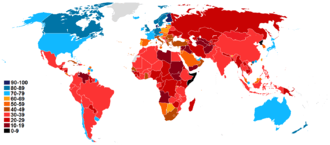Corruption in Turkey
| Political corruption |
|---|
 |
| Concepts |
| Corruption by country |
| Europe |
| Asia |
| Africa |
| North America |
| South America |
| Oceania and the Pacific |
| Transcontinental countries |
Corruption in Turkey is an issue affecting the accession of Turkey to the European Union.[1][2] In 2014, Turkey was ranked 64th of 175 countries on Transparency International's Corruption Perceptions Index.[3]
The 1998 Türkbank scandal led to a no-confidence vote and the resignation of Prime Minister Mesut Yılmaz. Although Yılmaz was investigated by Parliament, a five-year statute of limitations prevented further action.[4][5] On 17 December 2013, the sons of three Turkish ministers and many prominent businesspeople were arrested and accused of corruption.
Anti-Corruption Legislation
Anti-Corruption legislation includes Turkey's Criminal Code which criminalizes various forms of corrupt activity, including active and passive bribery, attempted corruption, extortion, bribing a foreign official, money laundering and abuse of office. Nevertheless, anti-corruption laws are poorly enforced, and anti-corruption authorities are deemed ineffective.[6]
Potential economic effects
Corruption has slowed business activity and the growth of the Turkish economy. Practices indicative of corruption include bribery, embezzlement, theft and fraud.
Growth
Corruption affects the institutional structures promoting growth in Turkey:
- Property rights: If government officials are bribed to seize properties from people, investments decrease as potential investors lose confidence.
- Patents and copyrights: Corruption increases theft and fraud, decreasing the flow of innovative technology.
- Efficient financial institutions: Corruption decreases the efficiency of financial institutions, such as banks. Corrupt government officials have collaborated with large banks to manipulate the country’s economy for their gain, decreasing trust placed in the banking system.
- Literacy and universal education: Corrupt government officials decrease spending on infrastructure and education, using the money saved for speculation.
- Free trade: Domestic businesses bribe government officials to raise tariffs, decreasing demand for imports and increasing demand for domestic goods.
- Competitive market system: Although Turkish law usually requires competitive bidding, some businesses attempt bribery to gain protection and favoritism from the government. A reduction in competitiveness can reduce market efficiency, encouraging monopolies and oligopolies.
Development
Economic development is the increase in standard of living and economic health of a country, reflected in its Human Development Index. For a country to develop economically it must invest in capital goods, such as infrastructure, health care and education. Unlike consumer goods, which promote immediate wealth for a nation, capital goods promote future development and a higher standard of living.
Corruption affects economic development in the following ways:
- Decreased spending on capital goods: A corrupt government spends less on capital goods, such as health care and education. This affects a country's population as its standard of living stalls or falls. In Turkey, 79.6 percent of health-care costs are covered by the Social Security Institution (Sosyal Güvenlik Kurumu).
- Abuses of power: Corruption encourages a government to use its power in ways detrimental to the majority of its citizens.
- Misappropriation of funds: To reduce (or avoid) taxation corrupt government officials often send their money overseas, reducing the money supply. A loss of money encourages the printing of more money, triggering inflation.
See also
- 2011 Turkish sports corruption scandal
- 2013 corruption scandal in Turkey
- Crime in Turkey
- Lost Trillion Case
- Media of Turkey
- Türkbank scandal
References
- ↑ Michael, Bryan (Winter 2004). "Anti-Corruption in the Turkey's EU Accession". Turkish Policy Quarterly.
- ↑ Alan Doug, (2010) "Asking the right questions? Addressing corruption and EU accession: The case study of Turkey", Journal of Financial Crime, Vol. 17 Iss: 1, pp.9 - 21
- ↑ Corruption Perceptions Index 2014. Full table and rankings. Transparency International. Retrieved: May 16, 2015.
- ↑ Zeynep Sarlak and Besim Bulent Bali (2007), Corruption in Turkey:“Is the donor content when the recipient is content?!, University of Konstanz Discussion Paper Series 9.
- ↑ Zeynep Sarlak and Besim Bulent Bali (2008), Corruption in Turkey: Why cannot an urgent problem be a main concern?
- ↑ "Turkey Corruption Profile". Business Anti-Corruption Profile. Retrieved 14 July 2015.
External links
| Wikimedia Commons has media related to Corruption in Turkey. |
